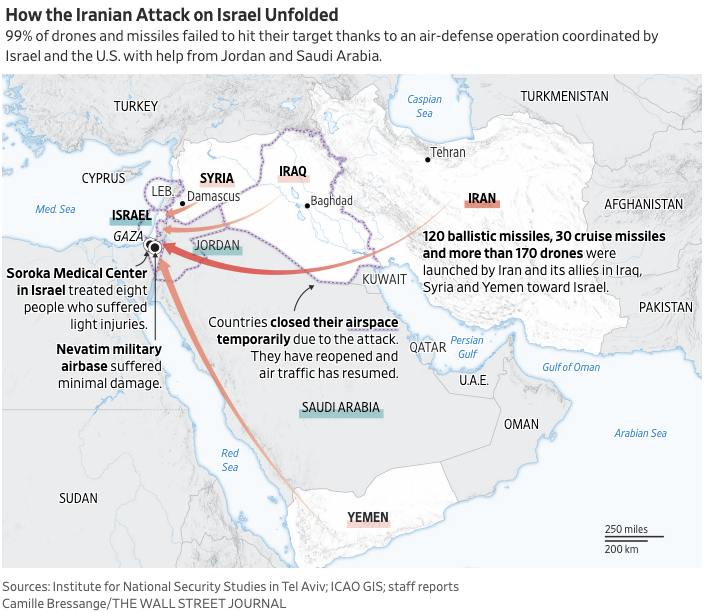Iran’s Intent and Israel’s Next Move
Two related questions.
The early speculation on Iran’s attack on Israel was that it was a shot across the bow for the domestic audiences that was intended to fail in order to avoid massive escalation. That may well be mistaken.
SEMAFOR‘s Jay Solomon (“Iran sought mass casualties in Israel strike, U.S. officials say“):

Iran’s weekend aerial attack on Israel was designed to cause mass casualties and infrastructure damage, senior U.S. officials said, an assessment that complicates deliberations on how to respond to Tehran and its military allies in the coming weeks.
The Biden administration on Sunday hailed a unified defense of Israel that included U.S., U.K. and French air power and allied Arab states, such as Jordan. Their anti-drone and anti-missile capabilities, combined with Israel’s Iron Dome air defense system, shot down 99% of the more than 300 munitions Tehran and its proxies fired into the Jewish state from Iran, Iraq, Syria and Yemen on Saturday.
Senior U.S. officials said neutralizing the assault was a strategic victory for Israel and its partners, and opens a window to de-escalate tensions in a Middle East region already on edge from Israel’s six-month war in the Gaza Strip. Iran’s operation came in response to Israel’s April 1 attack on an Iranian diplomatic mission in Damascus that killed two Iranian generals.
“With the support of a number of partners, including the U.K. and France, the United States enabled Israel to spectacularly defeat this unprecedented attack,” a senior White House official said on Sunday. “[The Iranians] were clearly intending to destroy and to cause casualties. That was their intent.”
Iranian diplomats and military officials said on Saturday that they weren’t seeking to launch new strikes, provided there were no Israeli reprisals. “The matter can be deemed concluded,” Tehran’s United Nations mission said in a statement.
But Israeli government officials said that Tehran had crossed a clear red line by attacking Israel directly from Iranian soil for the first time in history. They also said the nature of the targets — believed to be major civilian areas and military infrastructure —required a response if their country is to restore deterrence against Iran and its regional allies.
Yaroslav Trofimov, the Chief Foreign-Affairs Correspondent for WSJ (“Analysis: Israel Repelled Iran’s Huge Attack. But Only With Help From U.S. and Arab Partners.“) adds:
Saturday’s Iranian strike on Israel was huge by any standard. Tehran launched more than 170 explosive-laden drones, around 120 ballistic missiles and about 30 cruise missiles, according to Israel. The damage could have been catastrophic. As it turned out, almost all were intercepted.
That success was due to a combination of Israel’s sophisticated air-defense system and critical assistance provided by the U.S. and other Western and Arab partners. American, British and Jordanian warplanes played an especially important role in downing drones. Most of the Iranian drones and missiles were destroyed before they even reached Israeli airspace.
Whether Israel and its supporters can replicate that performance under the conditions of an all-out war—this weekend’s salvo from Iran, clearly telegraphed in advance, was the opposite of a surprise attack—is an open question, as is Israel’s ability to defend itself without outside help.
That is a key consideration as Israel and the U.S. consider responses to what is a new strategic reality, created by Iran’s first direct military attack on Israeli territory since the Islamic revolution of 1979. Israel’s war cabinet met in Tel Aviv on Sunday as the country’s leaders weighed their options, and Western officials said they believed Israel’s response could come quickly, as soon as Monday.
Striking back hard on Iranian soil could invite far more devastating retaliation. But not responding at all, or too weakly, could also erode deterrence, making Israel and others more vulnerable to future Iranian barrages.
“Iran has started a new phase. It has stopped hiding behind proxies and has now become exposed to a direct attack from Israel,” said Nadav Pollak, a former Israeli government analyst teaching at Reichman University. “Going forward, Israel is not going to be able to sit quietly and intercept everything.”
Interceptors, particularly the Arrow and Patriot systems used against ballistic missiles, are extremely expensive and are limited in quantity. The U.S. Congress, by stalling the military aid package for Israel, Ukraine and Taiwan, has created an additional complication.
Saturday’s attack, which Tehran says was carried out in retaliation for a suspected Israeli strike on April 1 that killed seven Islamic Revolutionary Guard Corps officers, including two generals, at an Iranian diplomatic mission in Damascus, has used up only a tiny fraction of the Islamic Republic’s vast arsenal of drones and missiles.
Crucially, Tehran has also kept in reserve its Lebanese proxy force, the Hezbollah militia, which has thousands of missiles and rockets. And, while only a handful of Iranian missiles got through on Saturday, causing minor damage to Israel’s Nevatim air base, the Iranian military has drawn valuable intelligence from observing how Israeli and U.S. air defenses operate.
“Iran was testing the missile-defense system, the resolve of the regional countries, the resolve of the United States,” said Jonathan Schanzer, a researcher at the Foundation for Defense of Democracies in Washington. “Out of all of this comes a great risk. When two powerful parties engage in direct hostility, no one knows where this thing goes.”
The commander of the IRGC, Hossein Salami, portrayed the Saturday barrage as creating a new strategic equation: Every Israeli attack on Iranian interests in the region will be met with a direct Iranian attack on Israel. This is, of course, a red line that Israel, which has been fighting against Iranian proxies for decades, cannot accept.
As it considers its response, however, Israel must also weigh the interests of its Arab partners, such as Jordan, Saudi Arabia and the United Arab Emirates. Despite popular anger over the killing of tens of thousands of Palestinians during Israeli military operations in Gaza, Jordan and other partners helped Israel fight off Iranian missiles and drones on Saturday.
“Our regional partners stepped up despite six months of very significant tension between them and Israel, and between them and the United States as they begged the United States to do something to restrain the Israelis,” said Steven Cook, a Middle East analyst at the Council on Foreign Relations.
Cook said that no matter how much countries in the region may dislike Israeli Prime Minister Benjamin Netanyahu, they dislike Iran’s government more.
Solomon adds his own analysis:
Iran’s attack brought into plain sight a conflict with Israel that’s played out largely in the shadows in recent decades. But as Tehran’s military reach and capabilities grow — including the near mastering of nuclear weapons technologies — Israeli military planners are debating whether any further delay in confronting Tehran directly will come at Israel’s peril.
[…]
Israel has watched Iran vastly grow its network of military proxies and partners — called the Axis of Resistance — to virtually encircle the Mediterranean country. The power of these armies has become brutally clear in the six months since the Palestinian military group Hamas, with Iranian money and arms, invaded southern Israel and killed 1,200 people. Iranian allies in Yemen, Lebanon, Iraq and Syria have sprung to life to back Hamas, often through strikes on Israeli and American targets. U.S. defense officials said these militias also took part in Saturday’s attack.
The sophistication of the Iranian axis’ weapons and tactics have also vastly improved. Saturday’s attack included ballistic and cruise missiles, as well as one-way attack drones that Iran has mastered building in recent years, and exported to allies globally. Iran and its most powerful regional ally — the Lebanese militia, Hezbollah — have also grown battle-hardened backing Syrian President Bashar al Assad in his war against internal opponents.
Current and former Israeli officials said this weekend that the prospect of a future Iranian attack using nuclear or chemical weapons-tipped missiles and drones shows the threat Tehran poses to their country’s long-term future. So while a counter strike might not happen this month, it will come at some point, they said.
[…]
Some foreign policy experts who’ve engaged with Iran questioned whether the country’s leadership was really seeking to inflict significant destruction in Israel. They noted that Tehran gave warnings for more than a week that Iran’s military intended to strike, and this included communications to the U.S. through Arab and European partners.
“Official and unofficial US-Iran back channel diplomacy…helped prevent this crisis from spiraling out of control,” wrote Suzanne DiMaggio of the Carnegie Endowment for International Peace, who has led back-channel discussions with Iran in recent years.
The evidence here is decidedly mixed. On the one hand, it’s quite likely that the Israel defenses—augmented by substantial external support—were more robust than Iran forecast. On the other, Iran did in fact warn of the strikes ahead of time and left assets in reserve. It’s plausible that Iran intended much more damage than was actually done and yet primarily intended this as a test run.
What is clear is that Iran and the United States have repeatedly demonstrated through their actions over a substantial period of time that they very much want to contain the conflict to nuisance levels. Neither has the slightest interest in crossing the threshold into all-out war.
It’s considerably less clear whether the Netanyahu government shares that reluctance. From their perspective, Iran is at war with Israel and has been for decades. They’re growing more powerful year by year and almost certainly have the capacity to become a nuclear power whenever they choose. I wouldn’t be surprised in the least if Israel ignored Biden’s warning and decided the time to dispense with the threat was at hand.






Iran, China, and Russia are working in tandem.
Today would be a great day for Republicans to stop undermining global security by blocking Ukraine aid.
These two snippets seem to be in direct conflict.
Since “senior US officials” are unnamed and have their own agendas, I lean towards the “if this was a serious attack designed to cause mass casualties and infrastructure damage, they wouldn’t have told everyone what they were doing so clearly.”
Iran’s government and military is either staggeringly incompetent and ineffectual, or they were deliberately pulling their punches.
@Gustopher: These are not mutually exclusive positions. Iran clearly wants to avoid crossing a red line that garners US support for a major offensive against its own territory. At the same time, shooting that many missiles and expecting that they’ll mostly be shot down is a hell of a gamble if you intend not to cause mass casualties.
My SWAG is that they thought the majority of missiles/drones would get stopped, after all they did announce the attack so it was hardly a surprise. They probably expected a significant number would get through and cause some damage. They probably didnt expect that the US, UK, France and Jordan would be able to coordinate so quickly and so effectively.
James- If asked, would you have predicted that we could have coordinated a defense this quickly or would you guess this was all anticipated? The degree of coordination seems exceptional to me given how many actors were involved.
Steve
One of Trump’s worst, if not the worst, foreign policy idiocies was killing the JCPOA, with which Iran was in compliance. Now we have this to deal with, thanks to his utter stupidity.
@steve: I knew that missile defense technology had improved significantly from the Gulf War, where Patriot missiles shooting down Scuds likely did more damage than the Scuds would have left alone, but am surprised by the success level here.
IIRC it was @Andy who pointed out that Iran probably used its entire launch capability. IOW, they fired all they could fire in an evening. If they intended to ‘pull punches’ they’d have restricted the attack to drones and maybe a cruise missile or two. The use of a large number of surface-to-surface ballistic missiles makes a mockery of the notion that Iran did not intend to do serious damage. They intended to cause mass casualties. The idea that Iran somehow chose to signal the world that they were militarily impotent and incapable of doing serious harm, is obviously absurd.
Israel targeted Iranian terrorists in an Iranian embassy in a terrorist state, Syria. Iran retaliated, attempting to cause serious damage, and failed. The Iranian government is not meeting today to congratulate themselves on a cleverly subtle attack. They’re wetting themselves because they’ve just realized they aren’t the power they thought they were. I imagine they’ll be considering moving the nuclear ball forward since their conventional missiles suffered from projectile dysfunction.
Other than 90 or so Jericho II ballistic missiles, does Israel have any weapons that can strike Iran directly?
How do they do that?
Also, reports the night of the attack said almost everything seemed to be aimed at the Golan Heights and bases in the Negev desert. If true, that hardly seems intended to cause mass casualties.
Joe Biden told Iran and their proxies “Don’t, don’t, don’t”. Kamala Harris repeated “Don’t” when asked.
Iran did. Hundreds of times
The weak US government now says to Israel, “Don’t give Iran a deterrence response”
@JKB: Oh, please, spare us your foreign policy ignorance. Iran will have nukes because of Trump. That’s what weak looks like.
A couple more thoughts:
– WRT Iran’s intent about casualties and destruction is really hard to say because the defense was so successful. We don’t really know what specific targets and aimpoints Iran selected because almost all of the weapons were shot down.
In the case of Iran’s retaliation against the US for Soleimani, they used their most accurate missiles and chose targets within installations that were very unlikely to kill US personnel. The messaging on this was clear – they were telling us they could have killed a lot of Americans and chose not to.
Did they have the same thing in mind with this strike against Israel? I don’t know, but I think it’s likely because I think they ultimately wanted to send the same message to Israel that they tried to send to us. But that brings me to:
-The mixed messaging and reporting. It’s important to keep in mind that Iran isn’t a unitary actor. Like Israel and the US, they have factions and internal disagreements. Some in Iran wanted a more symbolic retaliation to avoid a wider war and escalation, while others wanted a maximally destructive retaliation to kill as many Jews as possible. I’m sure many in Iran wanted to focus on trying to deter Israel from future actions like the Damascus strike in the future. It seems quite likely this strike was a compromise among various constituencies. So it was big and seemed intended to overwhelm defenses and to potentially cause a lot of damage and kill a lot of people. But Iran gave some warnings and tried to make it clear that this was a one-time retaliation, and it didn’t want further escalation despite the huge scale of the attack.
That’s a lot of conflicting and mixed messages, and I think that probably reflects conflicts within Iranian leadership about the core purpose of this attack. Perhaps this was a big punch, but one possibly intended to be pulled at the last second. Maybe the actual targets – had the weapons gotten through – were intentionally less important than they could have been and avoided places likely to kill a lot of people, as they were in the retaliation against the US.
Similarly, we seem to be seeing a similar dynamic playing out as Israel decides what it is going to do or not do in response.
@JKB:
Trump supporters will not be able to convince patriotic Americans they care about helping a US ally stand up to Iran more than the Biden administration does.
Iran is allied with Russia against Ukraine. Trump Republicans are explicitly dedicated to seeing Ukraine destroyed by Putin with Iranian and Chinese support, refusing for months to provide critical support.
Trump Republicans are deliberately weakening the US and its allies — who are being attacked by a Russian, Chinese, and Iranian axis.
@Michael Cain:
Israel’s primary strike capability is its air force, but Iran and Israel are quite distant from each other, with several countries in the way, so that is very challenging for anything more than a one-off raid.
Israel does have submarines with land-attack cruise missile capability, but the number of submarines and missiles they can carry and fire is small. The submarines could, of course, do other things like sinking Iranian ships.
For all the talk over the years by some about how much Israel is supposedly a threat to Iran, Israel actually has very limited long-range strike capabilities other than their nukes. They have focused their military efforts on threats much closer to home.
There’s a reason why Israel has wanted the US to “take care” of the Iran problem for three decades now.
@Andy:
Question: I assume Iranian ballistic missiles don’t have maneuver capability, so is it not possible to do the math and see the intended target? I was under the impression that we’ve been able to calculate the target of an ICBM for decades.
I just saw a British report that a significant number of the missiles failed soon after launch. Bad design or electronic countermeasures?
Quite a lot of the drones/missiles were brought down by US, UK, French and Jordanian defenses, which I would suggest makes the ‘pulled punch’ theory less likely – Iran could not have been sure western/Jordanian defenses would be so co-ordinated, so engaged, let alone this effective.
If different factions controlled different weapons, they were nevertheless clearly co-ordinated.
I’m trying to imagine the planning session where some Iranian general explained:
‘We’re going to fire a fukton of weapons, including our best stuff, but we’re thinking a lot will get knocked down, and our crack targeting will ensure that we send a message without doing serious damage. Unless one goes off course. Or is knocked off course. Or is shot down over Jerusalem but the warhead lands. Or we have so many shot down we look toothless.’
I think the much more likely scenario is, ‘We’ll fire a fukton of weapons and some will get shot down, but a lot of the ballistic missiles will make it through because we’ll confuse the defense with a swarm of drones.’
@Andy:
Unless of course they’re given support from the countries that really, really want Iran weakened and are located just across the Gulf. You can say it’s unlikely, but in years past it would have been unthinkable that the Arabs would do anything protective of Israel. And no one would have thought the Emiratis and Saudis would stay quiet on Gaza.
@Michael Reynolds:
Yes, you can calculate a general target pretty quickly – say, a specific airbase. More advanced designs have terminal guidance that would allow targeting precise parts of an airbase. I don’t honestly know enough about Iran’s missile systems to know if the longer-range missiles that Iran used have this capability or how accurate they are. I do know the missiles used against us in Iraq are very accurate, but those are short-range and were not used in this attack.
Yes, I read that potentially up to half the missiles either failed on the launchpad or during flight such that anti-missile systems didn’t need to even try to intercept them. If true, that would make the ballistic missile defense performance less impressive and, frankly, more realistic, but it also doesn’t speak well for Iran’s missile program. As for what caused so many malfunctions – hard to say for certain. Iran has never fired this many missiles at once before, which is likely part of it. Some of these missiles are reportedly newer designs with not a lot of test flights. You try to do something big that you’ve never done before with complex systems on a tight schedule – things can go wrong. That would be my guess. It’s just very difficult to go from firing a few missiles a year for testing and proficiency to firing over 100 in an hour or two when you’ve never done that before. It’s easy to make mistakes.
I don’t think it’s different factions controlling different weapons; I think it was at the planning level—the strategy for the overall retaliation plan was a compromise between these various factions, which is why a lot of it seems contradictory. At least, that’s my guess.
Yep!
@Andy:
I think this – practical experience – tends to be overlooked in a lot of amateur military analysis, for instance when considering China. They may have great toys but they haven’t fought a war since they lost to Vietnam 45 years ago. An amphibious assault on Taiwan has to be just about as complicated as an exercise can be. I’m shallow on Chinese history, but I believe their (OK, Mongols) last attempt at amphibious invasion did not go well. Even a more experienced military, Russia’s, can screw things up to an impressive degree.
Had the strike done more damage it is likely Bibi would have gotten meaningful support, domestically and otherwise, to “take out” Iran. I doubt the IDF is telling Bibi they can do that on their own though. As Andy mentioned, their long range strike ability is rather limited. Considering the long history of Israel deflecting large batches of HAMAs rockets it seems more likely than not the Iranians considered it unlikely they could cause mass casualties with what they sent…nevertheless, they took that risk.
No nation can sit idly by when their top generals are being targeted for assassination. The objective was likely discouraging that behavior.
What would a war between these two look like?
Neither is set up to project power on the other’s territory, though both can strike each other. Israel could invade Lebanon (again, see 1982 and the Lebanese civil war), to try to wipe out Hezbollah. Imagine Gaza on a bigger scale, and with more innocent people in the way.
The US can project power just about anywhere. We saw how well that worked in Afghanistan and Iraq, and to a lesser extent in Libya. Anyone who starts another quagmire war should be impeached, convicted, drawn, quartered, and cremated.
@Andy:
This is an important to consider – Iran has been trying to push the US into a war with Iran for a long time. They really want Iran “taken care of” and are happy to trade a lot of dead Americans for that.
@Michael Reynolds:
That’s the big unknown with China. They have a lot of hardware. A lot of personnel. A lot of industrial capacity. A good technology base. A lot of nationalism. A unified vision. All of that counts for a lot and in several of those areas, we are behind. But having a lot of stuff and motivation doesn’t – by itself – win wars.
Here’s CENTCOM’s official statement on what the US did, for anyone interested:
@Michael Reynolds: It’s my understanding that Israel’s Air Force does not have aerial refueling capability. If that is so, the round trip distance with a full bomb load would be questionable. Unless Israel is willing to do a Doolittle style raid its ability to attack targets in Iran is limited.
@a country lawyer:
Apparently we’re selling them the KC-46, but I don’t know if any have been delivered. We could presumably lend them some of ours, Lend-Lease style, but I doubt you can train pilots for that overnight.
I wonder if we’ve given them Tomahawks? I wonder if Jordanian or Iraqi air defense would try to knock them down.
@a country lawyer:
My understanding is they use a modified C-130 Hercules for such a purpose. Kc-130 something.
@Andy: I agree entirely on both of your posts here. I know people who live in Iranian cities where in general Iranians either love American stuff or at least want a closer relationship with us. The thing is Iran is just like the USA in that it has religious crazies in control of sections of the government. AT the end of the day people are going to people regardless of their location.
I was surprised by the effectiveness and coordination of the defense and I’m pretty sure Iran was caught off guard by that too. I also imagine Iran was caught off guard by how hard it is to actually engage in such a large attack. Coordination and all that..
@Michael Reynolds: I have no idea how much practical experience Israeli pilots have with in air refueling. It’s a delicate dance between pilots and boom operator. Andy touched on the realities of this stuff in his last post.
@Matt: I had a backseat ride in an F-16 once and we did an aerial refueling. It was the only time in the entire flight I got nervous. The two aircraft are SO close.
@Kathy: @Kathy: All C-130 tankers that I’m familiar with use wing mounted drogue and basket where the receiving aircraft flies the probe into the basket and takes fuel. All naval aircraft like the A-4 which I flew take fuel this way. The Air Force uses the probe type where the refueler flies a probe into a receptacle in the body of the receiving aircraft. The F-16 flown by the IDF uses probe refueling. I don’t think a C-130 can be reconfigured for air force style refueling. The Israeli Air Force can and has trained with the U.S. AirForce in aerial refueling but I think the Biden administration would reluctant to provide refuelers for an offensive strike against Iran.
Does Israel have the capacity to “dispense with the threat” by any means short of a nuclear strike, which Netanyahu is surely not crazy enough to launch? I would have thought not. That’s why his strategy for more than 30 years has been to stoke conflict between Iran and the USA; a strategy Repubicans have been and still are happy to go along with.
But viewed objectively, an Israel determined to remain defiant against hostile regional powers which can only acquire increasing military strength over future years is an Israel destined to become more and more dependent on great and powerful friends. Client states like that end up doing what they’re bloody well told by their protectors, a fact of life Netanyahu is perhaps just beginning to understand.
@a country lawyer:
How about the F-35? I think one variant, which may not be the one Israel has, can be modified for drogue and basket refueling.
The Wikipedia page on the IAF lists seven 707 tankers. It says 707, not KC-135.